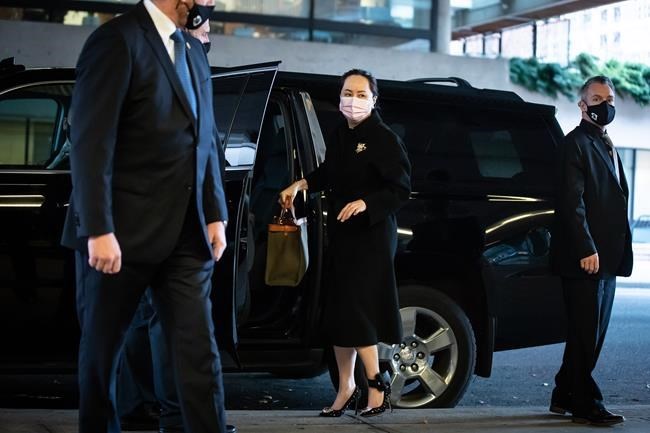Prime Minister Justin Trudeau joined the chorus of official silence Friday surrounding reports that the United States is seeking to negotiate a plea deal of sorts with detained Huawei scion Meng Wanzhou.
Trudeau refused, like U.S. officials, to acknowledge a Wall Street Journal report that Justice Department lawyers have approached Meng's legal team about the possibility of a so-called deferred prosecution agreement.
The newspaper says in exchange for admitting some level of wrongdoing, Meng — who faces wire and bank fraud charges in the U.S. — would be allowed to leave Canada, where she has been awaiting extradition for the last two years.
Meng, who has so far reportedly rejected the prospect of a deal, was detained in Vancouver in December 2018 at the behest of the Justice Department, which has accused Huawei of violating U.S. sanctions on Iran.
Her arrest sparked an intractable diplomatic standoff that continues to this day, and has been widely linked to China's decision days later to detain Canadians Michael Kovrig and Michael Spavor, who face charges of espionage.
Canada's "absolute priority" is the safe release of Kovrig and Spavor, Trudeau said Friday during a news conference outside his Rideau Cottage residence in Ottawa.
"We're going to continue to work as hard as we possibly can to bring these two Michaels home," Trudeau said.
"It's been extremely difficult for them, for their families and their loved ones. We will continue to stand up for Canadians in difficulty anywhere around the world."
Marc Raimondi, a Justice Department spokesman, also refused to comment on the reports Friday, as did officials at the International Crisis Group, where Kovrig worked. Queries to the White House also went unanswered.
The sudden effort to secure a resolution, coming as it does in the final days of Donald Trump's presidency, has a tinge of politics to it, said Brett Bruen, a consultant and former U.S. diplomat who worked as an adviser in Barack Obama's administration.
With a potential Trump comeback being planned for 2024, the current president may be looking to claim a win on China before he leaves office — and to deny one to his incoming successor, Joe Biden.
"President Trump wants to have talking points for potentially another campaign, and — probably more importantly, from what I'm hearing — his political movement," Bruen said.
"He wants to be able to both attack Biden as being weak on China — he didn't get the concessions and the kind of change that Trump did — and also to be able to make the case that (Trump) could have done more if only he had more time."
China has repeatedly urged the U.S. to abandon the extradition of Meng, and decried Canada as being complicit in what they consider an arbitrary and unjust abuse of the extradition agreement between the two countries.
The U.S. alleges Meng orchestrated the use of Skycom, a Huawei subsidiary, to evade sanctions against Iran between 2009 and 2014.
China detained Kovrig and Spavor 10 days after the arrest of Meng, who is also the daughter of Huawei's founder, Ren Zhengfei.
The good news for the Michaels, Bruen said, may be that China would far prefer to do a deal with the current outgoing administration, which appears very motivated.
"They would much prefer to strike a deal with Trump, because they know that he is looking at the short term, whereas Biden is going to make it contingent on medium- and long-term concessions," he said.
"For Beijing, it's far preferable to give up a couple of Canadians and perhaps even put out some statement that is fairly meaningless, but that Trump will tout as a major victory."
Huawei has close ties to China's military and is considered one of the country's most successful international enterprises, operating in the high-tech sphere where China hopes to establish international dominance.
The detentions and deteriorating relations also spilled over into Huawei's push to build Canada's next-generation wireless networks.
The U.S. has been lobbying aggressively against Huawei, urging Australia, Canada, Germany and Japan, among others, to close their networks to the company.
This report by The Canadian Press was first published Dec. 4, 2020.
— With files from Mike Blanchfield in Ottawa
James McCarten, The Canadian Press




